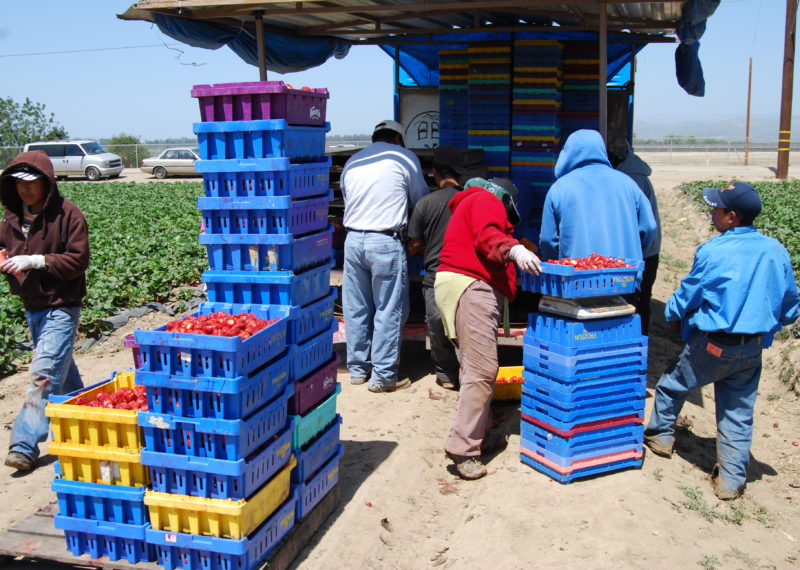In August 2020, at the end of an unusually hot and dry summer, wildfires spread across Northern California. The LNU Lightning Complex fires burned through more than 360,000 acres over the course of six weeks, striking the area’s vineyards and becoming one of the most destructive wildfires in California’s history.
Tens of thousands of people evacuated, but one group stayed.
Grape harvesting, which usually runs from August until November, had just begun, and farm workers rushed into evacuation zones, some without protective equipment, to save the harvest.
Some of those workers were friends and family members of Anabel Garcia, who recounted their ordeal. “The ash was raining around them while they were picking grapes,” she told Nexus Media News. Garcia, herself a farm worker, said she had worked through previous wildfires without proper eye protection and only a bandana to protect her from breathing in smoke.
Sonoma County grants farmers exemptions from mandatory evacuations, allowing them to send workers into areas that others have been forced to flee. The “ag pass” aims to help farmers protect their crops during increasingly frequent climate disasters, but a 2021 report found that the exemption also puts workers at risk.
“They are protecting their products but not the workers,” Garcia said. “But we deserve proper training and protection.”
Garcia was among dozens of farm workers and supporters who rallied in front of the Sonoma County Board of Supervisors in April. Among other things, they were demanding premium hazard pay, disaster insurance, and Indigenous-language wildfire safety and evacuation information for the many Latin American farm workers who speak little Spanish.
Farm work is one of the most dangerous jobs in America. Every day about 100 farm workers suffer an injury that causes them to miss work, according to the Centers for Disease Control. In 2019, 410 workers died on the job. Many of these deaths are related to operating heavy machinery, but grueling hours and exposure to the elements also put them at risk. Hotter temperatures and wildfire smoke exposure—both exacerbated by climate change—are making things worse.
“Climate change is creating forms of disparate impacts to migrant workers, farm workers, [and] particularly, undocumented farm workers,” Michael Mendez, an assistant professor at UC Irvine who studies the impact of climate disasters on migrant farm workers, told Nexus Media.
The CDC has found a correlation between temperatures above 90 degrees Fahrenheit and work-related injuries; climate change also likely increases pesticide use, according to the Union of Concerned Scientists, compounding the risks to farmers.
The heat also contributes to longer, more intense fire seasons, which in turn contaminate the air farm workers breathe. “Many of them have told us that they would come home [with] black saliva from working so many hours, days and sometimes even weeks in smoky conditions,” Mendez said.
At least 384 farm workers died of heat-related causes in the United States between 2010 and 2020, according to an investigation published last year by NPR and the Columbia Journalism School. The report found that the three-year averages of worker deaths had doubled since the early 1990s. Many more are hospitalized with heat-related illnesses, like heatstroke; chronic exposure has been linked to kidney damage. Other studies have shown that hospitalizations tend to increase in extreme heat and that outdoor workers, including farm laborers, are among the most vulnerable. As the climate continues to warm, farm work will only become more dangerous.
U.S. agricultural pickers will see the number of days that exceed heat safety standards double by 2050, according to a 2020 study. Wildfire-related air pollution could triple in the Pacific Northwest by the end of the century.
Agriculture workers are a uniquely vulnerable workforce. Most of the roughly 2.5 million farm workers in the U.S. are foreign-born and about half are undocumented, according to the Department of Agriculture. Most do not receive health insurance, sick leave or overtime pay, according to Farmworker Justice, an advocacy group. Undocumented farm workers are also excluded from social protections afforded to documented residents, such as Covid-19 relief and unemployment insurance.
“These individuals are rendered invisible in the context of public policy and disaster relief infrastructure because of systemic racism and cultural norms regarding who is considered a worthy disaster victim,” said Mendez. But, he added, “These individuals are speaking up against the disproportionate impact climate change is [having] on them. Migrant rights’ activism [is] expanding to include climate change.”
Farm workers across the country are advocating for climate-specific protections, such as rules requiring employers to provide protective equipment, paid rest and shade when temperatures or air pollution reaches a certain threshold.
The Occupational Safety and Health Administration announced last year it was exploring the possibility of creating a federal heat standard. This came after lawmakers in both houses of Congress introduced a bill calling for federal workplace protections against excessive heat. The Asuncion Valdivia Heat Illness and Fatality Prevention Act of 2021 was named for a farm worker who died of heat exhaustion in 2004. At least four states—California, Oregon, Minnesota and Washington—have implemented extreme heat standards for workplaces.
But climate change is also figuring much more prominently in the fight for basic protections.
In April, Oregon lawmakers passed a law phasing in overtime pay for farm workers, becoming the eighth state to do so. Though climate change was not mentioned explicitly in the bill, several of those testifying in the bill’s favor cited it as a need for more protections.
“Farm workers are among a group of workers most impacted by the dangerous effects of the climate crisis and burning fossil fuels, such as more frequent, severe heat waves, increased smoke from growing wildfires and exposure to diesel exhaust pollution,” wrote Brad Reed of Renew Oregon, a clean-energy advocacy group. Climate and environment organizations, like Sunrise Rural Oregon, Beyond Toxics and the Oregon Just Transition Alliance, also submitted testimonies.
Ira Cuello Martinez, climate policy associate at the farm workers union Pineros Y Campesinos Unidos del Noroeste, said he was encouraged by environment and climate organizations’ support for the bill. “There is a very clear connection to environmental justice because farm workers are being exposed to these climate hazards and there’s a need for these protections,” he said. “I think it’s a very exciting time to see a stronger blue-green alliance between labor and environmental justice.”
Like Garcia’s group in Sonoma, farm workers in Oregon are also demanding hazard pay and disaster insurance. Last December, the Oregon legislature allocated $10 million in direct payments to agricultural workers who have to miss work due to extreme heat or smoke.
Martinez called the move “a bandage to a more long-term problem” and suggested more comprehensive reforms were needed to keep workers safe.
“We know that with these climate hazards, it’s only going to become more frequent and more intense in the years to come,” he said.
This article was made possible by a grant from the Open Society Foundations. Nexus Media News is an editorially independent, nonprofit news service covering climate change. Follow us @NexusMediaNews.


